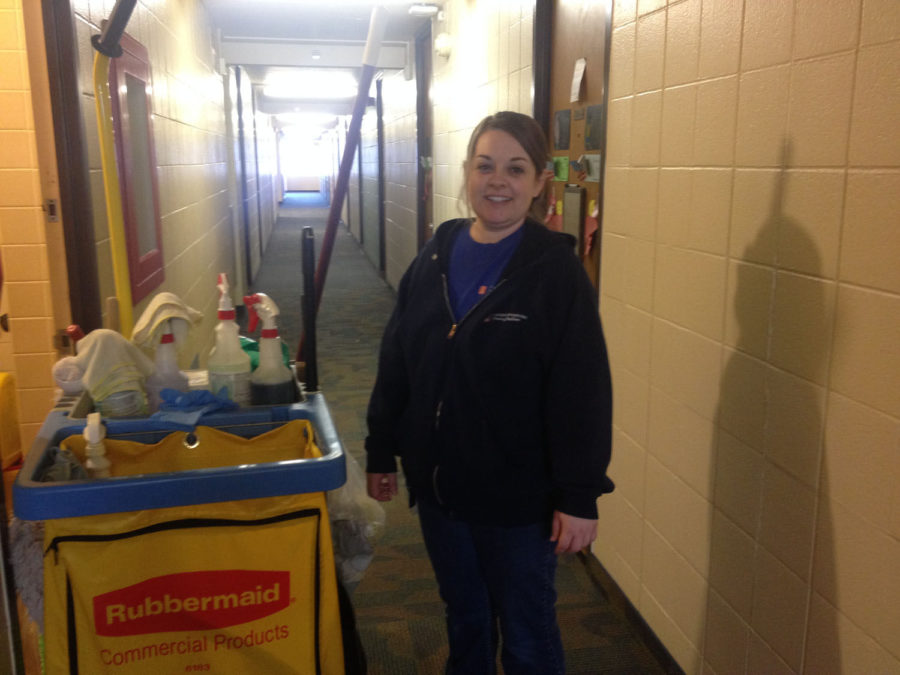Q&A with PAR BSW employee, Carrie Darsham
February 24, 2015
Residents at Pennsylvania Avenue Residence Hall may recognize this friendly face walking in the halls of Blaisdell and Saunders. But, make no mistake, she is not a resident. The Daily Illini got a chance to speak with Building Service Worker Carrie Darsham, to get a sense of what it is like to work in a residence hall.
The Daily Illini: How did you get your job at the University?
Carrie Darsham: My mother-in-law worked at the University as a linen maid, and so I kind of got in through her. One of the best things about working at the University would definitely be the benefits. Between the health insurance, even the vacation and sick time, it’s just wonderful benefits.
When my husband and I had our first kid, I did not work (at the University) and was under my husband’s health insurance. I had a C-section, and the bill was around $4,500. With our second child, I was working at the University, and I had another C-section. The health insurance at the University, with all my doctors appointments and the three-day stay in the hospital, the cost was about $250. It’s a big difference. You definitely can’t beat the insurance. I really appreciate it.
DI: How long have you been working at the University?
Get The Daily Illini in your inbox!
CD: I’ve been working here for going on 11 years. I’ve worked at LAR and PAR. I started out on weekends at PAR for a little more than three years, then LAR for a Monday through Friday job for five years, and then I came back to PAR. When I was at LAR, I was in Shelden, and it was all girls so it stayed really, really clean. One of the reasons I went back to PAR was because Shelden was going co-ed. When I worked at LAR, it was definitely a lot cleaner, but that’s okay.
DI: What does a typical day at work entail?
CD: It depends on the time of year. Over the school year when the students are there, if you’re Monday through Friday, you are assigned a run. I’ve got three floors, first and third floor Saunders and third floor Blaisdell, that I take care of. And over the summer we clean the dorm rooms and do the floor work and that kind of stuff when the students are gone.
DI: What do you look forward to when coming to work?
CD: Interacting with the students. Each year you get to meet new people from all over, and it’s just nice to make those connections. There was one girl years ago when I worked at LAR whom I built a really strong friendship with throughout the year. I’ll probably always remember her. When she was moving out, she had her mom bake me some cookies. She brought them to me, and that really touched my heart and I thought, ‘Wow, that was really awesome.’ This year a resident adviser at Blaisdell made me a snow globe. It makes you feel like what you do is worth it and that someone is appreciating it.
DI: I bet. And, on the other hand, what do you look forward to the least when coming to work?
CD: Certain messes that we have to clean up. I’m sure if you use your imagination you could think some up. It is what it is, though. So you just clean it up and go on.
DI: What do you want students to know about your job?
CD: It is pretty hard work. Some people might not think so, you know mentally it might not be much, but physically it definitely takes a toll on your body.
DI: Besides your job, what do you want students to know about you?
CD: I enjoy spending time with my husband and kids. I enjoy reading, watching sports and camping with my family. It’s relaxing. And I’m a regular person, like everyone else. It would be nice if students kind of thought, ‘Hey these are people, too.’ Some students don’t even acknowledge us when we say hi. They could just be having a bad day or something but it’d be nice if they can acknowledge us, because we’re people, too, and there are several students who do. You just sometimes get the occasional ones who act like you’re not really there, but there are not too many of those.
This interview has been edited for clarity and length.
Hanadi can be reached at [email protected].







